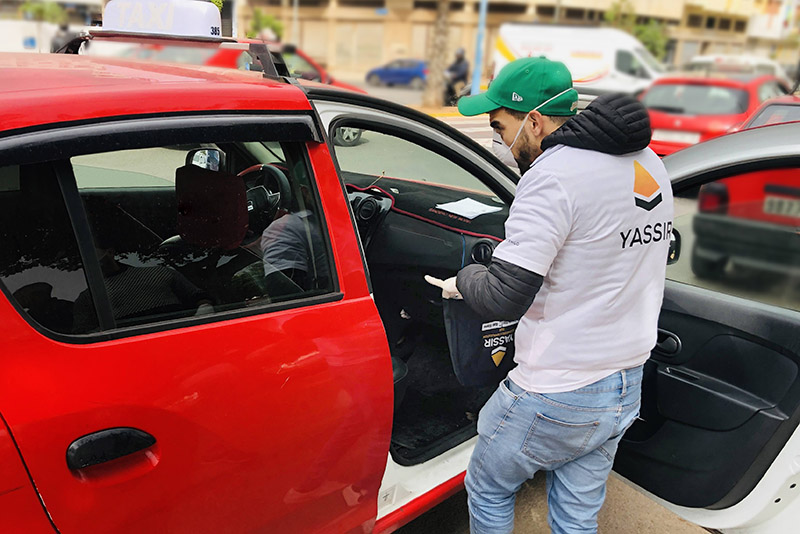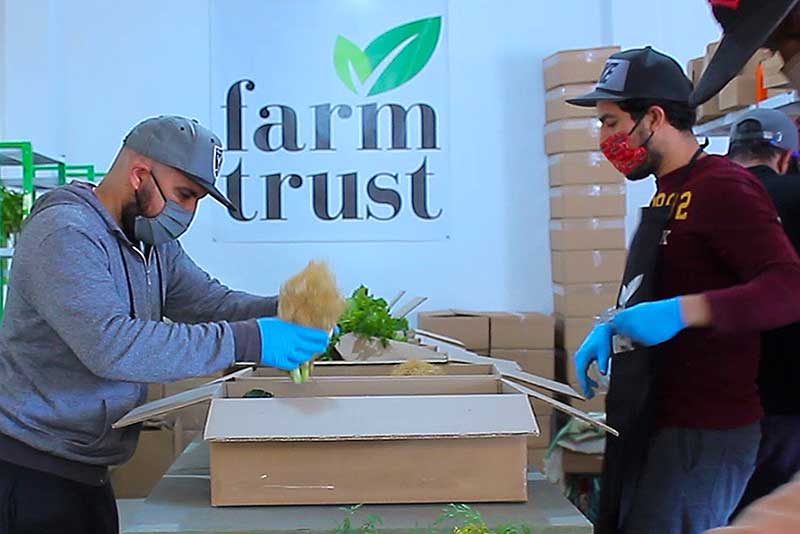By Shobhna Decloitre
As the coronavirus began a deadly march across Algeria last month, entrepreneur Nourredine Tayebi was struck by one thing.
Despite pleas from officials to stay home, Algerians with relatively minor ailments were still flocking to hospitals and clinics, turning those places into breeding grounds for the virus.
So Tayebi, the founder of YASSIR, an Uber-like ride hailing service, decided to do something about that.
With YASSIR’s engineers, he developed an online platform that would allow doctors to do pro-bono video consultations with patients, cutting down on the crush of people in hospital waiting rooms.
“In Arabic, yassir means making things easier, and as a business operating in Maghreb, we felt we had a responsibility to come to the aid of the people we serve,” Tayebi said.

YASSIR's Fleet Lead, Hassan Ait Lahcen, inspects a taxi sanitized as part of a community campaign in Casablanca, Morocco. © Abdelilah Abouelfadel
Since the first case of COVID-19 appeared in the Maghreb in late February in Algeria, the disease has quickly spread across the region. As of April 27, there were 8,396 confirmed cases and 624 deaths reported across Algeria, Morocco and Tunisia, according to WHO data. With the pandemic threatening to overwhelm local healthcare systems, Algeria, Morocco, and Tunisia all ordered lockdowns in late March, confining some 90 million people across the three countries largely to their homes.
YASSIR is part of a wave of technology startups helping the Maghreb, a region of North Africa bordering the Mediterranean Sea, weather COVID-19. These businesses, many brand-new and with only a handful of employees, are doing everything from prepping students for college to delivering fruit to those in quarantine.
"Start-ups are spearheading innovation and new models for development in the region," said Xavier Reille, IFC Country Manager for Maghreb. "The breakthroughs we're seeing are a testament to the potential of young entrepreneurs to not only tackle COVID-19, but many of the challenges already facing the region."
The Maghreb Startup Network, launched last year by private sector actors with the support of the World Bank Group, is mapping startups like YASSIR and their COVID-19 response to facilitate idea sharing and replication across countries in the Maghreb. Several of these startups share how they’re responding to the challenges and needs created by the pandemic to support their communities.
Opening Virtual Classrooms
In Morocco, where school has been suspended since March 16, Moroccan start-up eDukaty, offers virtual classes that prepare students for entrance exams into top-tier business and engineering schools. Amid the coronavirus pandemic, eDukaty has made its classes available for free.
"People are suffering here. With weak internet connections teachers cannot offer classes from their homes. So, we have qualified teachers coming to the eDukaty office in Casablanca and using our set-up to provide live classes," said co-founder Othmane Akherraz.
For Lehyanti Mohamed Amine, a 19-year old student at the Lycée Réda Slaoui in Agadir, the online eDukaty courses mean he doesn’t have to delay his preparation for entrance exams to business school. While exams have been postponed from April to June, Amine isn’t losing critical study time.
“When my lycée closed, it took some time for the classes to resume online. With eDukaty, my online classes continued as normal. I am glad I had no disruption to my preparation for the competitive exams,” he said.
Doctors Going Digital
The pandemic has put pressure on the strained health care systems in the region, giving rise to creativity among startups and a boost to telemedicine demand.
DabaDoc, which links patients to doctors through a website and a mobile phone app, has experienced a significant increase in demand for its services. The platform, originally set up in 2014 to allow patients to select doctors and book appointments, now hosts 8,000 doctors across Morocco, Algeria and Tunisia, said co-founder Zineb Kaitouni.
"With the start of this pandemic…doctors reached out to us saying they needed our tool, asking that it be expanded beyond general practitioners to all specialists,” said Kaitouni. “My team had to work overnight to adapt the platform to receive millions of patients and thousands of doctors at the same time.”
With COVID spreading, some people may also need medical equipment for treatment at home. Medical manufacturing company Viventis, based in Tunisia, is doubling up its efforts to create an oxygen concentrator, which boosts the source of oxygen for patients and can be an important tool in post-COVID home care. The product isn’t on the market yet, but the company is awaiting EU certification, a requirement for new medical devices to be used in the Maghreb.
“We started working on the oxygen concentrator before the coronavirus outbreak. We realized earlier on that being entirely dependent on imported medical equipment was not a sustainable option,” said Viventis Chief Operating Officer Mehdi Bouzouita, adding that it is also suitable for patients moderately affected by the coronavirus undergoing treatment at home.

The start-up Farm Trust supplies 80 boxes of food daily. © Salma Aloui
Keeping the Nation Healthy
Another Tunisia-based startup, Farm Trust, is helping people to eat healthy foods while in quarantine. The startup delivers fresh fruit and vegetables directly from farm to homes in the country’s capital, Tunis. It's racing to keep up with demand, which has surged 300 percent since the pandemic began. Farm Trust is delivering 80 boxes daily to new clients and existing clients, who are ordering more boxes of fruit and vegetables for delivery than normal.
The company has hired employees laid off from the country's beleaguered tourism sector doubling its workforce to 20, said co-founder Wessim Khiari. The startup is also donating 10 percent of all sales to disadvantaged families.
Farm Trust is a start-up accelerated by Impact Partner and Flat6Labs Tunisia; two accelerators supported by IFC.
"Eating fresh fruit and vegetables is particularly important now to build stronger immune systems, " said Khiari.
For Ness Zouaoui, a Farm Trust client who has become a regular as a result of the COVID crisis, Farm Trust is replacing family visits to markets no longer possible amid the country lockdown.
“In normal times, my dad would go to the markets, seek out his favorite produce sellers, and buy fruits and vegetables. For now, that is no longer an option,” said Zouaoui.
Published in April 2020
